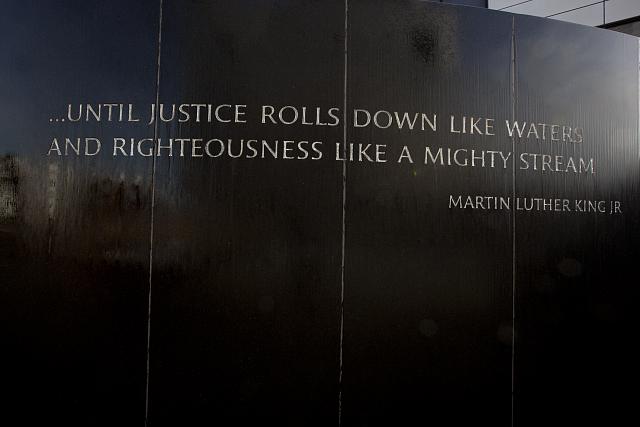Editor’s note: Peter Miller describes meeting with Dr. King to discuss his visit to our campus. And brings back the spirit of the times in so doing. Read on.
Nearly fifty years ago, I met Dr. Martin Luther King Jr. I had a Saturday lunch with him and his advisors, in the Parish House attached to the National Cathedral, in Washington DC. It was March 30th, 1968.
Dr. King was to give the Sunday address at the Cathedral, which was a distinct bravery on the part of the Cathedral. King was fully engaged in mobilizing the workers in the South, especially in Memphis, where he would a week later be killed. By 1968, events had isolated King. The Vietnam war had become such a violent abyss that it overwhelmed the news. King’s non-violence and his slowly marching campaign was seen as correct but almost too proper, certainly too formal and in an odd way, antiquated.
The war protests were vicious and viciously revealing and there were real and metaphoric deaths in every view. The authorities supported the war with the utmost fear and patriotism – families were torn apart in their opinions and New England, a bastion of the sense that it must all make sense, was not able to hold. And has not, to this day, repaired.
Dr. King came out against the war in Vietnam but no one wanted him to and few thought it appropriate and it left him appearing out of touch. The worst declared him a fool and the kindest murmured that this was not his province. He should stick to segregation, as if one racism had no spit on another.
For some reason, I had decided that Williams College, where I was a senior, should declare itself against the war. I believed it would help if there was no question that this liberal citadel were to state frankly that the war was wrong. Williams had several members on the War administration, several people running banks and was generally up to its clever neck in the notion, reason and unfolding of the war itself. Though we were not quite clear on just how far up to its neck Williams had wagered.
(It was my first and last protest – I learned several things that have protected me from ever again having such an idea. I learned, for example, that Williams had no intention of letting me close the school to make a point. I also learned that, like Trump, you can be surprised who votes for whom.)
I was invited to have lunch with Dr. King by my friends at the parish. They felt he would have some interest in the protest, so I drove down from Williamstown, bringing with me a Vermont ham, as a present. To my mind, there would be a great mass of people there but I hoped to be able to at least say hello and show my support.
But it was a very small, and intimate lunch. Dr.King, with Andrew Young and Ralph Abernathy and a few others. They were a weary group, having just come up from Mississippi, but they loved the ham and said so. I asked Dr. King for a moment and told him the plans for the Vietnam protest.
No one was by then asking him to talk about the war. I just wanted his perspective on the idea of declaring Williams College against the war. But he looked at Young and then back at me and said, we will come up and speak. If he had said he was coming to my birthday, I would not have been more shocked. It never occurred to me to ask if he would speak.
He was right, of course, it would have been a perfect place for him to speak – I was the only one too dumb to see that. He would have made the event 1000 times more literal.
We shook hands, and they all left the lunch together. I did not, in truth, know what had happened.
Dr. King gave a sermon the next day, titled Remaining Awake Through a Great Revolution. It was a speech against the war and it is rarely spoken of today. It was not even available for many years but you can now google it.
That night, March 31st, Lyndon Johnson came on the radio and declared that he would not run for re-election. I heard it as I was driving back north and burst into tears, for it meant that something had broken and burst. The breath of all protest, so easily kept full with the drawl of this Texan, was done. The war would grind itself into a bunker. It was a hell of a Sunday.
It was, as if Donald Trump were to declare he had decided to retire – as if he were to say, I knew all along I was not the one to be president. It was that big a shock.
On Thursday, that coming week, I went home to Hartford to see my dad. When he got home from work, the news broke that Dr. King had been shot and killed. He woke me from a nap and held my shoulder as he told me the news.
Two months later, June 5th, Presidential candidate Bobby Kennedy was shot and killed. And five months later, November 5th, Richard Nixon was elected president. And so ended 1968.
MLK Day. It is always important to keep some of history close.

